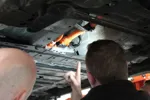How and why people behave as they do has been a rich vein of academic research over many years. People from different walks of life and cultures can view the same object, situation or brand in completely different ways.
It is one of the things that makes consumer behaviour so difficult to predict. We often make the mistake of bringing with us our own prejudices and perceptions and then try to impose them on others. Just because we perceive things in a particular way does not mean others will perceive them in the same light.

Professor Jim Saker is
director of the Centre for
Automotive Management
at Loughborough
University’s Business
School and an
AM Awards judge.
He has been involved
in the automotive
industry for more
than 20 years.
It has always fascinated me that the Chinese students I meet view Clarks Shoes as a luxury brand. For me, Clarks was known for its school shoes, but it was never really regarded as high fashion. However, to the vast majority of Chinese visitors I have encountered it is viewed as a very desirable brand for all ages.
This also applies to us and our industry. The general public views the motor retail sector from one perspective, those of us operating within it from another. One of the major problems is that those who work in the industry and sell cars very rarely actually buy one from them, so don’t see the process from a customer’s perspective.
At times, one of the most dangerous perceptions is how politicians see our sector. The Volkswagen dieselgate scandal has placed the industry even higher on the political agenda and as a result it appears to have reinforced a negative perception held by some MPs.
VW has carried out just 10% of its dieselgate fixes
As reported earlier in this magazine, there is an ongoing political discussion on how VW is progressing in completing the fixes on the 8.5 million vehicles affected by the defeat device software it installed. It had originally planned to carry out all the work by the end of 2016, but at the time of writing, only about 10% had been carried out.
This has prompted comments from both Europe and Westminster. The European Commissioner for Justice and Consumers, Vˇera Jourová, wants VW to set an end date for all the repairs to be completed.
In the UK, Louise Ellman, MP, who chairs the transport select committee, described the manufacturer’s effort as “simply unacceptable”. She said: “One year on from the Volkswagen emissions scandal, nine out of 10 drivers are still waiting for their car to be recalled. Time and time again, VW’s schedule has slipped. This is simply unacceptable when Paul Willis, VW UK’s managing director, promised the transport committee that VW drivers could expect to have their cars fixed by the end of the year.”
Basically, her negative perception is that VW is not moving fast enough and, as a result, UK consumers are suffering.
However, having spoken to a half-dozen Volkswagen dealers and customers, their perception is somewhat different.
Some customers are concerned that any fix may affect the performance of their car, with which they are quite happy. There is no incentive for the customer to go to the inconvenience of taking their car in to have a fix undertaken when they are very happy with the car as it is.
As more than 85% of new cars are bought on PCPs with a guaranteed final value, a lot of customers feel no reason to have the work done. One dealer said a number of their customers had had work done on their cars, but have insisted that they don’t want the emission adjustments made. From the customer’s perspective, many are simply asking ‘why bother?’
The emission scandal doesn’t affect the safety of the car and in a couple of years the customers will trade in or out of the franchise, depending on how they feel at the time. Dealers cannot force people to come in and have the work done, neither can the manufacturer, or in this case the EU or the British Government. Just because there is outrage among the political elite does not necessarily mean that it is felt by the man on the street. At the moment, it appears VW drivers don’t see any urgency.
VW did something badly wrong
Although VW did something badly wrong and has admitted it, putting it right is not totally within its control. It is its customer base that will dictate the speed of any fix. VW can send out letters, but unless there is seen to be a benefit for the customer it is unlikely to happen at any great pace.
As was seen with the Brexit vote, it is easy for politicians to misread the view of the British public, especially if they feel they are being told what to do by Brussels. Politicians can rant and rave, but unless they understand consumer behaviour they are likely to be ignored, as are any letters from Volkswagen.













Login to comment
Comments
No comments have been made yet.